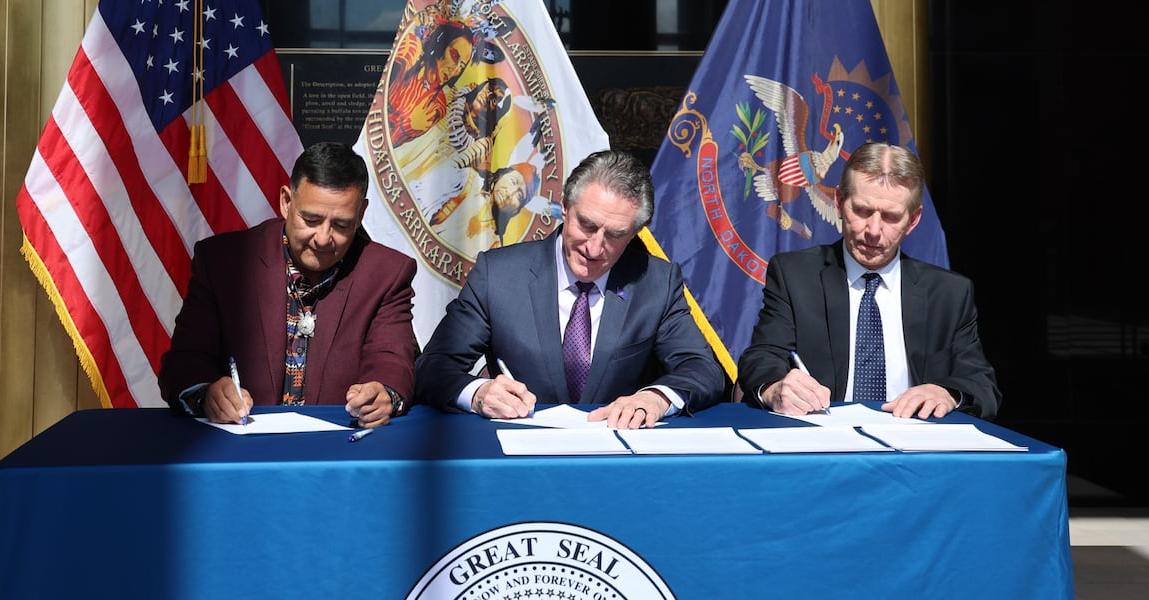
- Details
- By Levi Rickert
Mandan, Hidatsa and Arikara (MHA) Nation Chairman Mark Fox, North Dakota Governor Doug Burgum, and State Tax Commissioner Brian Kroshus on Friday signed a historic alcohol tax revenue sharing agreement.
The revenue-sharing agreement between the tribe and the state was made possible through Senate Bill 2377, signed into law by Burgum last year. The bill allows each of the five tribal nations in North Dakota to enter into an agreement with the state to impose a single tax on alcoholic beverages sold at the retail and wholesale levels within their respective reservations.
Tribal nations that adopt the alcohol tax will keep 80 percent of the tax revenue, while the state’s general fund will receive 20 percent. MHA Nation is the first tribe to execute an agreement with the state under the new law.
“The MHA Nation has been contending with the impacts of alcohol being sold on our reservation for a very long time. It has greatly burdened our judicial system with domestic violence, alcohol-related injuries and deaths from vehicle accidents, and various forms of crime,” Fox said. “This new tax revenue will help relieve the tremendous amount of money our government spends yearly to provide treatment services related to alcohol addiction, social and wellness services, and supplement enhancements to law enforcement. I would like to thank Governor Burgum, State Tax Commissioner Brian Kroshus and the North Dakota State Legislature for working with us on this agreement that benefits our Nation and the State of North Dakota.”
The bill was approved unanimously in both the House and Senate. It improved upon an alcohol tax revenue-sharing bill that passed in 2019 but hadn’t been utilized.
"This agreement underscores the commitment of the state of North Dakota and MHA Nation to work together for the mutual benefit of their communities. It provides exactly the kind of fair and uniform framework for collecting alcohol taxes on reservations that we hoped to achieve when signing the legislation last year,” Burgum said, noting the bulk of the revenue will go to the tribes to support addiction treatment and other programs.
The Governor’s Office worked with tribal nations, legislators, and the Office of the State Tax Commissioner for several years to negotiate an acceptable framework for revenue-sharing agreements and avoid a double taxation situation in which both the state and tribe could levy separate alcohol taxes on reservations.
More Stories Like This
Native News Weekly (August 25, 2024): D.C. BriefsUS Presidents in Their Own Words Concerning American Indians
Native News Weekly (January 18, 2026): D.C. Briefs
Federal Judge Orders ICE to Halt Use of Pepper Spray, Arrests of Peaceful Protesters in Twin Cities
Tunica-Biloxi Cultural Leader John D. Barbry Walks On
Help us defend tribal sovereignty.
At Native News Online, our mission is rooted in telling the stories that strengthen sovereignty and uplift Indigenous voices — not just at year’s end, but every single day.
Because of your generosity last year, we were able to keep our reporters on the ground in tribal communities, at national gatherings and in the halls of Congress — covering the issues that matter most to Indian Country: sovereignty, culture, education, health and economic opportunity.
That support sustained us through a tough year in 2025. Now, as we look to the year ahead, we need your help right now to ensure warrior journalism remains strong — reporting that defends tribal sovereignty, amplifies Native truth, and holds power accountable.
 The stakes couldn't be higher. Your support keeps Native voices heard, Native stories told and Native sovereignty defended.
The stakes couldn't be higher. Your support keeps Native voices heard, Native stories told and Native sovereignty defended.
Stand with Warrior Journalism today.
Levi Rickert (Potawatomi), Editor & Publisher


